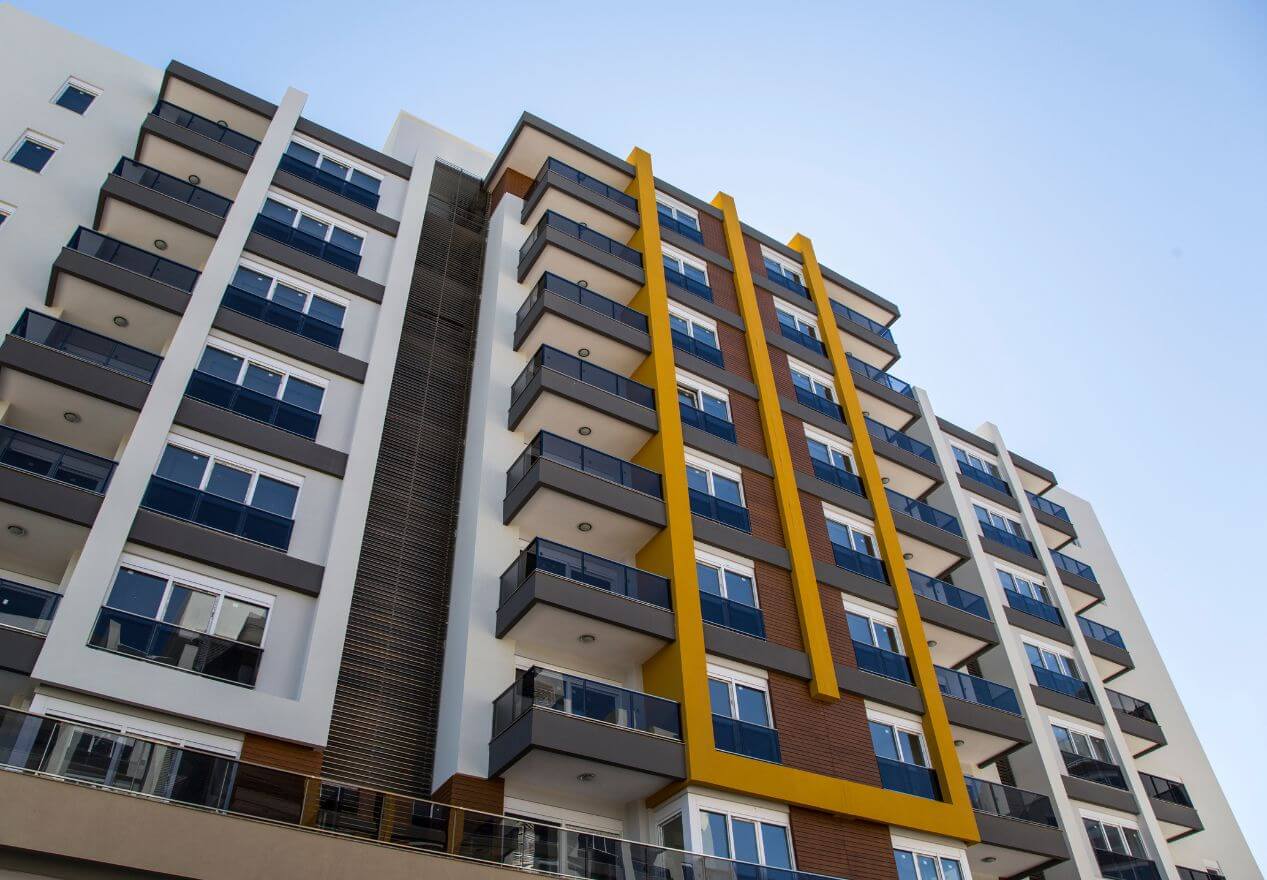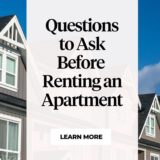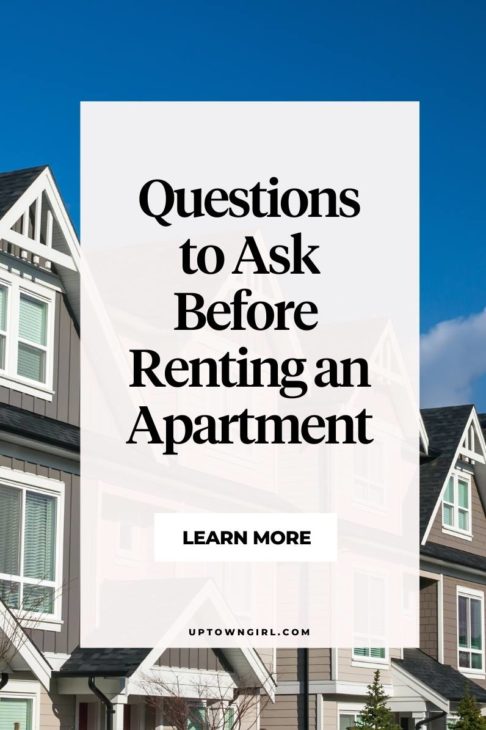14 Questions to Ask Before Renting an Apartment

When Keren is not actually tapping away at her keyboard,…
Apartment hunting can be exhausting, so it’s easy to give in to the temptation to sign on the dotted lines of the lease agreement the moment you find a property that meets all your requirements.
But, don’t do that – at least, not until you get these questions answered by your landlord. Taking them into consideration will ensure there are no unpleasant surprises later on, which can greatly improve your living experience.
1. How much is the rent and security deposit?
This is the first question you should ask your landlord – as it will determine whether or not an apartment meets your budget requirements.
Apartment prices fluctuate daily, so you will need to confirm whether the rent matches the online advertisement. You should also familiarize yourself with the payment methods accepted and how late fees are assessed, so you can budget accordingly and pay your rent before the grace period ends to avoid paying extra.
2. Are any utilities included in the rent? For those that aren’t, how do I pay for utilities that I cover?
Apartment complexes cover utilities like water, pest control, and garbage disposal, which are typically included in your monthly rent. However, you may be responsible for gas, electricity, and heating bills, so make sure to ask your landlord what’s included and what’s not.
Once you’re familiar with the utilities you’ll have to pay from your pocket, find out how the cost is metered, what the estimated cost is for a tenant in a similar unit, and also enquire about the service providers the complex uses. Knowing the overall cost will help you calculate and maintain your rental budget easily, which will make settling into a new home a breeze.
3. What amenities are included?
When touring an apartment complex, ask to see the amenities.
Most apartment complexes will have on-site gyms, gardens, and pools, but this will vary depending on the location and pricing range of the complex units. You might also find appliances like laundry and dishwashers in your unit, which will surely be a cost-effective add-on.
4. What is the parking situation?
Ask if your rent includes parking, and if it doesn’t, what costs should you expect.
Also, ask about the parking options available. Will you have access to covered or open parking spots or will you be required to share parking spots with other renters on a first-come, first-served basis? If that is not an option, can you park your vehicle in nearby streets or garages?
Once the landlord helps you figure that out, check the parking situation yourself to make sure it meets your requirements.
5. What is the guest policy?
Having visitors is usually not an issue, but the duration of their stay might be limited. Your visitor(s) may be required to sign in for safety reasons. Some complexes are against guests staying for longer than 2 weeks, while some require that you notify the concerned authorities if you’re having long-term guests.
Details vary between complexes, but they’ll be covered in the lease agreement. However, if you have concerns that are not documented in the lease, bring them up with your landlord so you don’t violate your lease unintentionally.
6. What is the pet policy, and do you require a pet fee/deposit?
Not all apartment complexes are pet-friendly, but some may change their stance on a case-to-case basis, so make sure to ask your landlord about their pet policy.
Ask if there are any restrictions based on specific breeds and weight limits and also enquire about the fees you’ll be expected to pay, which may include pet fees, extra cleaning charges, and deposits.
7. What is the application process and screening criteria?
Found an apartment that ticks all the right boxes? Ask about the application process, screening criteria, and application fee. If the apartment is a catch, there is a strong chance someone will snatch it up, so make sure you have references, pay slips, security deposit, and credit report on hand to speed up the process.
8. Will my rent increase? What are my options for lease renewal?
If you’re in it for the long haul, ask your landlord for information on rent prices based on lease length. If the expected rent hike is more than you can afford, make sure to inquire whether a short-term or month-to-month lease is an option.
Knowing what to expect will allow you to look for another apartment at your own pace, which will ensure you don’t “settle” for whatever comes your way.
9. What changes can I make to the apartment?
If you want to add your personal touch to the apartment to transform it into a home, make sure you check with your landlord first. Know what’s allowed and what’s not before signing the lease, or you may find yourself forfeiting your security deposit.
10. Are there any plans to update the apartment complex?
Updates in the apartment complex usually mean two things:
- An upcoming rent hike due to updates in amenities and appliances.
- An uncomfortable living situation due to construction, which may lead to increased noise, obstructed views, and many other unpleasant add-ons.
Both scenarios have their own sets of pros and cons, so it will be a good idea to know what to expect so you can make your apartment leasing decisions accordingly.
11. How do maintenance requests work, and how do you handle emergency repairs?
Ask your landlord how maintenance requests work, how repairs get handled, and what the typical turnaround time is for repairs. While you can’t really expect to have an emergency situation such as a faulty gas line or burst pipe on your hands, knowing how it will be handled can prepare you for it.
12. Is the neighborhood safe?
Ask the landlord about the safety and crime rate of the neighborhood.
To be sure, you should also indulge in some research of your own to familiarize yourself with what’s hot and what’s not. You can do this by walking around the neighborhood at night, reading online reviews, and checking public records.
13. Can I sublet my apartment?
Even if you don’t plan on moving out before your lease is up, it’s a good idea to know what your options are so you don’t have to pay money to break out of your lease, in the event of an emergency. Ask your landlord if they allow early lease terminations, and if they don’t, inquire about their stance on subletting.
Some complexes have stringent rules against subletting, and breaking the rules can cost you anything from penalties to eviction.
14. When can I move into the unit?
If a property meets all your requirements, you’ll want to move in asap. However, you may find yourself getting held back due to your current lease, or the apartment might require some work before it’s suitable for living. Ask the estimated time when you can move in, so you can make adjustments and hire movers accordingly.
Final Thoughts
Asking these questions during your apartment tour will give you an insight into the property to ensure you find a place you’ll love. An honest discussion with the landlord will help you understand the expectations and responsibilities of both parties, and can avoid any potential conflict or misunderstandings down the road.
Save the image below to Pinterest so you can come back later!
When Keren is not actually tapping away at her keyboard, you’ll find her staring into space or drinking copious amounts of coffee. But make no mistake, she's hard at work even then. Come close enough and you’ll hear the whooshing noise of countless words as they go whizzing by - in her head of course.








